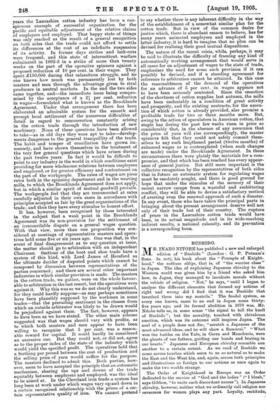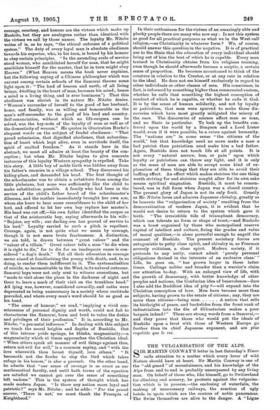M R. INAZO NITOBE has published a new and enlarged edition
of " Bushido " (London : G. P. Putnam's. Sons. Ss. net), his book about the "Precepts of Knight- hood," the 'noblesse oblige, that is, of "the warrior class" in Japan. The idea of explaining Japanese chivalry to the Western world was given him by a friend who asked him how, in Japan, they managed to inculcate morals without the vehicle of religion. "Not," he says, "until I began to analyse the different elements that formed my notions of right and wrong did I find that it was Bushido that breathed them into my nostrils." The feudal system, as every one knows, came to an end in Japan some thirty. five years ago, and its formal abolition in 1870 was, Mr. Nitobe tells us, in some sense "the signal to toll the knell of Bushido "; but the morality, touched with chivalrous emotion, which was its outcome still inspires Japan. The soul of a people does not die; "scratch a Japanese of the most advanced ideas, and he will show a Samurai." "What won the battles on the Yalu, in Corea and Manchuria, were the ghosts of our fathers, guiding our hands and beating in our hearts." Japanese and European chivalry resemble one another to a certain extent. As we read of Bushido we* come across touches which seem to us so natural as to make the East and the West kin, and, again, across both principles and illustrations so foreign to our notions as once again to make the two worlds strange.
The Order of Knighthood in Europe was an Order dedicated to the service of "God and the ladies" ("I blush," says Gibbon, "to unite such discordant names "). In.Japanese chivalry, however, neither what we ordinarily call religion nor reverence for women plays any part. Loyalty, rectitude,
courage, courtesy, and honour are the virtues which make up Bushido, but they are analogous rather than identical with the virtues we call by those names. The loyalty Mr. Nitobe writes of is, as he says, "the ethical outcome of a political system." The duty of every loyal man is absolute obedience towards his superior, who, in his turn, is bound by his honour to obey certain principles. "In the ascending scale of service stood woman, who annihilated herself for man, that he might annihilate himself for the master, that he in turn might obey Heaven." (What Heaven means the book never explains, but the following saying of a Chinese philosopher which was current among Certain schools of the Samurai throws some light upon it : "The lord of heaven and earth, of all living beings, dvielling in the heart of man, becomes his mind; hence a mind is a living thing, and is ever luminous.") That this obedience was slavish in its nature Mr. Nitobe denies. "Woman's surrender of herself to the good of her husband, home, and family, was as willing and honourable as the man's self-surrender to the good of his lord and country. Self-renunciation, without which no life-enigma can be solved, was the key-note of the loyalty of man as well as of the domesticity of woman." He quotes in illustration Burke's eloquent words on the subject of feudal obedience : "That proud submission, that dignified obedience, that subordina- tion of heart which kept alive, even in servitude itself, the spirit of exalted freedom." As it stands here in the abstract, we must all admire at least the beauty of the con- ception; but when Mr. Nitobe begins to give concrete instances of this loyalty Western sympathy is repelled. Take this story. A little boy of noble birth was hidden away from his father's enemies in a village school. They discovered his biding-place, and demanded his head. The first thought of the schoolmaster was to obtain a substitute from among the little plebeians, but none was sufficiently like the child to make substitution possible. A. family who had been in the service of the child's father beard of the schoolmaster's dilemma, and the mother immediately brought her own son, whom she knew to bear some resemblance to the child of her lord, and offered to let her own boy replace her master's. His head was cut off,—his own father identified the corpse as that of the aristocratic boy, saying afterwards to his wife : "Rejoice, my wife ; our darling son has proved of service to his lord." Loyalty carried to such a pitch is repellent. Courage, again, is not quite what we mean by courage, though it is not mere brute fearlessness. A distinction, we are told, is drawn between "great valour" and the "valour of a villain." Great valour tells a man "to die when it is right to die," for to die for an inadequate cause is con- sidered "a dog's death." Yet all their education in courage seems aimed at familiarising the young with death, and, in so doing, to render them indifferent to it. The systematisition of suicide; so inconceivable in the West, is its natural outcome. Samurai boys were not only sent to witness executions, but "made to visit alone the place in the darkness of night and there to leave a mark of their visit on the trunkless head." All lying was, however, considered cowardly, and oaths were deprecated as being unnecessary in a society where rectitude prevailed, and where every man's word should be as good as his bond.
"The sense of honour," we read, "implying a vivid con- sciousness of personal dignity and worth, could not fail to characterise the Samurai, born and bred to value the duties and privileges of their profession." It is, according to Mr. Nitobe, "a pre-natal influence." In dealing with this subject we touch the moral heights and depths of Bushido. Out of this intense pride springs, he thinks, magnanimity.—a magnanimity which at times approaches the Christian ideal. "When ethers speak all manner of evil things against thee, return net evil for evil," is a common saying, and "with the love wherewith thou lovest thyself, love others." " It becometh not the fowler to slay the bird which takes refuge in his bosom," is also a proverb. On the other hand, he admits that "our sense of revenge is as exact as our mathematical faculty, and until both terms of the equation are satisfied we cannot get over the sense of something left undone." This is the system of thought which has made modern Japan. " Is there any nation more loyal and patriotic?" says Mr. Nitobe ; and he adds "For the proud answer, There is not,' we must thank the Precepts of Knighthood."
In their enthusiasm for the virtues of an amazingly able and plucky people there are many who now say : Is not this system as good for all practical purposes as what we in the West call religion,--as Christianity in whatever form ? We, of course, should answer this question in the negative. It is of practical use to the State that the education of every individual should bring out of him the best of which he is capable. Every man trained in Christianity obtains from his religious training, even though he should afterwards become a sceptic, a certain sense of proportion. He becomes accustomed to think of the creature in relation to the Creator, or at any rate in relation to the ideal. He does not see himself exclusively in regard to other individuals or other classes of men. His conscience, in fact, is informed by something higher than consecrated custom, whether he calls that something the highest conception of conduct of which be is capable, or whether he calls it God. It is by the sense of human solidarity, and not by loyalty or patriotism, that men were spurred to make those dis- coveries which have most greatly mitigated the misery of the race. The discoveries of science affect man as man, and no State in particular. To lock up the benefits con- ferred upon the world by a Simpson and a Lord Lister would, even if it were possible, be a crime against humanity. The "nations are" in some sense "the citizens of the world," but that knowledge need no more make a man- a bad patriot than patriotism need make him a bad father. Again, Bushido does not touch life at all points. It is not every "natural sorrow, loss, or pain" upon which loyalty or patriotism can throw any light, and it is only as the mass of men are able to accept some kind of ex- planation of these things that they are able to avoid their baffling effect. An effect which makes stoicism the one thing worth striving for and stoicism sought after for its own sake means spiritual stagnation. Bushido, it must be remem- bered, was in full force when Japan was a closed country. The- present glory of Japan is not its only fruit. Greatly as Mr. Nitobe loves and admires Japanese chivalry, greatly as he laments the "vulgarisation of society" resulting from the democratisation of modern Japan, it is evident that he would not desire to return to the system which gave it birth. "The irresistible tide of triumphant democracy, which can tolerate no form or shape of trust,—and Bushido was a trust organised by those who monopolised reserve capital of intellect and culture, fixing the grades and value of moral qualities,—is alone powerful enough to engulf the remnant of Bushido. The present societary forces are antagonistic to petty class spirit, and chivalry is, as Freeman severely criticises, a, class spirit. Modern society, if it pretends to any unity, cannot admit purely personal obligations devised in the interests of an exclusive class.'" Life, he goes on, "has grown larger in these latter times. Callings nobler and broader than a warrior's claim our attention to-day. With an enlarged view of life, with the growth of democracy, with better knowledge of other peoples and nations, the Confucian idea of benevolence—dare I also add the Buddhist idea of pity P—will expand into the Christian conception of love. Men have become more than subjects, having grown to the estate of citizens ; nay, they are more than citizens—being men A nation that sells its birthright of peace, and backslides from the front rank of industrialism into the file of filibusterism makes a poor bargain indeed !" These are strong words from a Samurai,— and they prove that those who would put the ideals of Bushido upon a level with those of Western Europe go further than its chief Japanese exponent, and are plus royaliste que le roi.



































 Previous page
Previous page